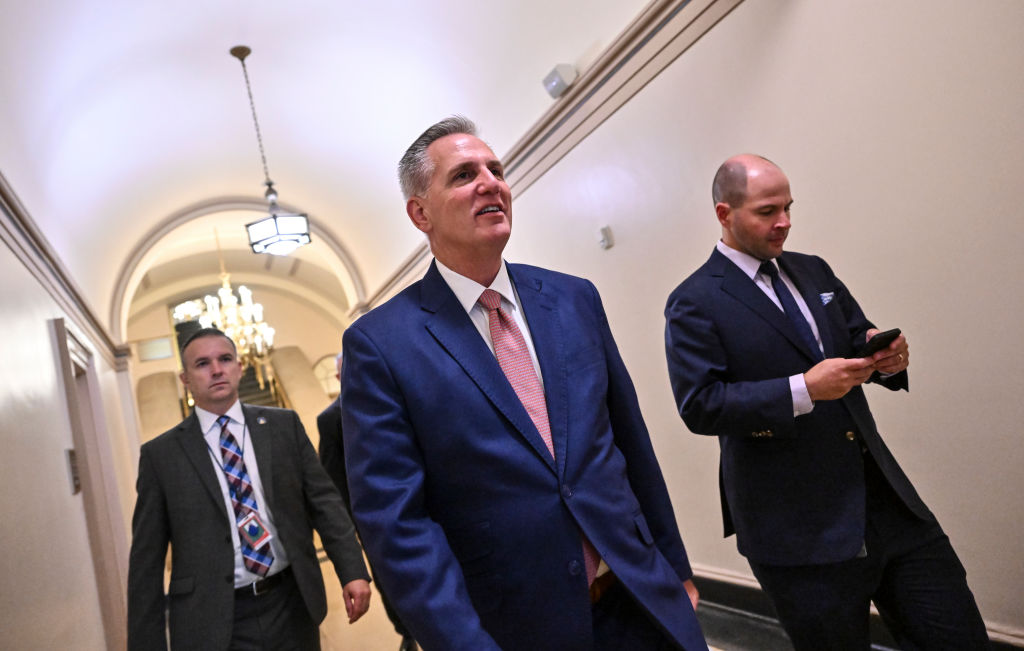Happy Monday! As of Friday, Sen. Chuck Schumer has reportedly ditched the Senate’s unofficial dress code—though he’s said he’ll continue to wear a suit.
The rule change may appeal most to Sen. John Fetterman—who is often seen around the Capitol in his signature gym shorts and a hoodie—but we hope it means Sen. Joe Manchin finally breaks out the Mothman costume we’re pretty sure he has.
Quick Hits: Today’s Top Stories
- The White House announced Sunday National Security Adviser Jake Sullivan and Chinese Foreign Minister Wang Yi met in Malta over the weekend, where Sullivan reportedly urged Yi against providing weapons to Russia in support of Moscow’s invasion of Ukraine. The two also reportedly discussed “peace and stability in the Taiwan Strait” and agreed to high-level “consultations in key areas.” The meeting comes as China’s defense minister—who has not been seen in several weeks—is reportedly under investigation for corrupt procurement practices.
- Ukrainian President Volodymyr Zelensky will attend the United Nations General Assembly’s annual meeting in New York City this week before arriving in Washington, D.C., where he’ll meet with President Joe Biden and senators on Capitol Hill. Zelensky is expected to appeal to U.S. and international leaders for continued aid as officials leading his country’s armed forces said over the weekend they have retaken three villages around Bakhmut in eastern Ukraine.
- Iran expelled roughly one-third of the inspectors representing the United Nations’ nuclear watchdog over the weekend after more than 60 countries, including the U.S., expressed concern over Iran’s lack of compliance with the Nonproliferation Treaty’s “Safeguards Agreement.” Specifically, the countries had called on Iran to explain the presence of traces of uranium at undeclared nuclear sites. The head of the International Atomic Energy Agency, Rafael Grossi, panned the move on Saturday. “I strongly condemn this disproportionate and unprecedented unilateral measure,” he said. The expulsions come one week after the Biden administration issued a waiver allowing banks to release $6 billion in frozen Iranian funds as part of an exchange to free Americans held by Iran.
- Mexico extradited Ovidio Guzmán—the son of Sinaloa cartel drug lord Joaquin “El Chapo” Guzmán—to the U.S. last week to face drug charges. Mexican officials captured the younger Guzmán in January, and he and his brothers—who are responsible for much of the fentanyl produced and smuggled into the U.S.—were indicted by the Justice Department in April.
- Republican Texas Attorney General Ken Paxton was acquitted by the Texas state Senate on Saturday on all 16 articles of impeachment stemming from accusations of corruption and abuses of power. Only two Republicans crossed the aisle to vote with the 12 Democrats in the chamber to convict on several articles, leaving the senate well short of the 21 votes necessary to convict Paxton on any of the 16 individual charges. Axios reported yesterday some Texas state senators came under pressure from national Republican-aligned organizations threatening to fund primary challengers if they voted to convict. Paxton was immediately reinstated after his acquittal, ending a suspension that began in May.
- Authorities in Hawaii announced Friday that 97 people died in last month’s devastating Maui wildfires, slightly below the original death toll estimate of 115. The revision comes after weeks of extensive DNA analysis that revealed some remains in the possession of the Maui county medical examiner belonged to the same person. It’s possible, however, that the death toll may rise again as more remains are discovered.
- Politico reported last week that perhaps only a dozen women have taken advantage of a new Defense Department program allowing female service members to take paid leave and receive travel reimbursement for trips to seek reproductive treatment, including abortions. Republican Sen. Tommy Tuberville of Alabama has blocked the promotion of some 300 senior military officials in protest of the policy, and Defense Secretary Lloyd Austin has given no indication he will reverse course.
- In an interview yesterday with Kristen Welker on NBC News’ “Meet the Press,” former President Donald Trump denied he had ordered a Mar-a-Lago employee to delete security footage—one of the assertions in special counsel Jack Smith’s superseding indictment related to Trump’s alleged mishandling of classified documents and attempts to mislead the federal government about the documents whereabouts. Trump added he’d take the stand to give testimony to that effect: “Sure, I’m going to—I’ll testify,” he told Welker. But he added: “They were my tapes.”
- In a Friday court filing, federal prosecutors sought restrictions on what Trump could say about his prosecution by Smith regarding Trump’s alleged efforts to overturn the 2020 presidential election. Prosecutors claimed that Trump’s statements on social media, in particular, “undermine confidence in the criminal justice system and prejudice the jury pool through disparaging and inflammatory attacks on the citizens of this District, the Court, prosecutors, and prospective witnesses.” Smith’s team asked Judge Tanya Chutkan, who is overseeing the trial, to issue a narrow gag order on any Trump “statements about any party, witness, attorney, court personnel, or potential jurors that are disparaging and inflammatory, or intimidating.” Even if such an order is issued, it’s unclear what penalties might be levied against the former president should he violate it.
Slumping Toward a Shutdown

We got our first whiff of autumn here in D.C. over the weekend, with temperatures dipping into the 50s, a handful of leaves starting to fall, and House Republicans putting on a live-action performance of It’s the Great Pumpkin, Charlie Brown. Speaker Kevin McCarthy was in the titular role, with a handful of GOP hardliners teaming up to play Lucy. Instead of a football being pulled away at the last minute, however, it’s a deal to stave off a government shutdown that remains ever-elusive, just beyond McCarthy’s grasp.
After a lengthy summer recess, the House has now been back in session for about a week—but lawmakers don’t appear to have made much headway on funding the government for the coming fiscal year, which begins on October 1. Two intra-GOP factions appeared to reach an agreement last night that would push that deadline back a month, just as Lucy appeared to be holding the football steady for Charlie to give it the boot. Within minutes, more Republicans than McCarthy can afford to lose were out with statements panning the proposal, which wouldn’t pass the Democratic-led Senate even if House Republicans are able to coalesce.
Over the weekend, a contingent of GOP lawmakers from the hardline House Freedom Caucus (HFC) and the more moderate Main Street Caucus—led by Reps. Byron Donalds and Dusty Johnson, respectively—negotiated a proposed continuing resolution (CR) that would fund the government through October 31. The measure pairs a slight cut to discretionary spending—excluding defense, veterans, and disaster relief funding—with the Republican Secure the Border Act, minus a provision for electronic verification. The compromise would also involve a path to advance a must-pass defense appropriations bill this week. A vote on the CR itself is planned for Thursday. “I think we’re stumbling towards a solution in spite of ourselves,” Rep. Tom Cole—a McCarthy-aligned Republican and chair of the Rules Committee—said during the negotiations. And HFC Chair Rep. Scott Perry said in a statement last night, “We now have a framework for our colleagues across the House Republican Conference.”
But it seems that Perry may have put the cart before the horse—or wound up for the kick without checking that the ball was still sitting there. More than half a dozen Republicans—including multiple HFC members—were quick to declare their opposition to the CR. “I will not support this 167-page surrender to Joe Biden,” Matt Gaetz—an outspoken antagonist of Republican leadership—said.
If Gaetz and the other defectors—all longtime thorns in the side of Republican leadership—had any misgivings about holding up the process, they were likely emboldened by President Trump. “I’d shut down the government if they can’t make an appropriate deal, absolutely,” Trump told NBC News’ Kristen Welker in an interview that aired yesterday. “We’re at $35 trillion in debt, we have to save our country.” (More than $7 trillion was added to the national debt during the Trump administration.) Mike Pence and Ron DeSantis have also both backed the defectors and their resolve to shut down the government if spending levels aren’t cut sufficiently.
But it’s unclear how the strategy will result in lower spending levels. “The more they resist the CR, the less they’re gonna like the result in end of year appropriations because if you just take your ball and go home and say ‘I’m not gonna participate in this,’ the government isn’t shutting down forever and you just ceded whatever leverage you have to secure policy considerations and marginal spending curbs,” Liam Donovan—a lobbyist and former Republican Senate campaign operative—told TMD last week. But for members like Gaetz, that may not matter. “There’s no way to lose for these guys because losing in itself is a valiant effort that ends well for them,” Donovan argues. “If the Establishment sells you out, then you can say that you fought the good fight and it wasn’t your fault.” More moderate GOP members are also frustrated with what they view as the obstructionism of the hardliners. “The old adage is true,” said Nebraska Republican Don Bacon. “Some of these folks would vote against the Bible because there’s not enough Jesus in it.”
How did we get into the all-too-familiar shutdown scramble? Just a few months ago, a contingent of Republican rebels unsuccessfully fought McCarthy’s efforts to negotiate a deal to raise the debt ceiling. The product of the speaker’s negotiations with Democrats—the Fiscal Responsibility Act—raised the debate ceiling until January 2025 and included caps on discretionary spending. But HFC Republicans felt they “got rolled” during the process and that McCarthy failed to honor private promises he made with members during his marathon fight for the speakership earlier this year. HFC members openly revolted on the House floor in June, briefly blocking a procedural vote, also known as the “rule” on a Republican-led bill.
After the debt ceiling fight, McCarthy has even less cachet with GOP hardliners, and it showed in the party’s inability to move forward on spending bills in recent weeks. The House has passed only one of the twelve annual appropriation bills—the GOP passed a bill in July to fund military construction projects and veterans’ benefits. The HFC has said they will not vote for any of the remaining bills until leadership guarantees that the overall spending number won’t be over $1.47 trillion (the fiscal year 2022 topline). The speaker had to scrub a vote on Department of Defense funding on Thursday as the defectors maintained their opposition. “We’re going to have a shutdown, it’s just a matter of how long,” said HFC member Rep. Ralph Norman.
In an attempt to appease some of the hardliners, McCarthy formally launched an impeachment inquiry into President Biden last week, but most of the holdouts remained equally adamant in their criticisms of the speaker. Rep. Dan Bishop—a Republican of North Carolina—said he’d support McCarthy’s ouster if he relied on Democratic votes to break the log jam on spending (a strategy the speaker needed during the debt ceiling debate). “I’m prepared to support a change in leadership through the mechanisms of motion to vacate the chair, if necessary,” said Bishop. McCarthy’s frustration boiled over during the Republican conference meeting on Thursday. Responding to threats to oust him, McCarthy reportedly said, “If you think you scare me because you want to file a motion to vacate, move the f—ing motion.”
As with the debt ceiling negotiation, McCarthy has emphasized the importance of the House passing legislation to have a negotiating position. “I’ve been through shutdowns, and I’ve never seen somebody win a shutdown because when you shutdown, you give all your power to the administration,” he said Sunday. “On the Senate side, the Republicans and Democrats over there are writing bills to spend more money. Ours are the most conservative, but if we don’t pass them, we’re weaker in the negotiations.” The speaker also said over the weekend that he intends to get the holdouts on the record over the defense funding bill. “We will bring it to the floor win or lose and show the American public who’s for the Department of Defense, who’s for our military,” he said.
Donovan agrees with the assessment. “If you choose to disengage, and just shut the government down and say, ‘hell no, we’re not gonna bargain,’ then that’s just handing the pen to the Senate to write the bills, and that’s what’s going to become law,” he told TMD last week. At this point, it’s highly unlikely Congress can get through 11 spending bills in time, so a CR will be needed with or without a shutdown. Republican leadership will have to scramble to flip some of the no votes or try to pass some other measure soon to at least get on the board as the Senate proceeds apace with bipartisan negotiations—although some GOP senators have slowed progress on the upper chamber’s spending bills.
“The end of every fiscal story is the House Freedom Caucus votes no,” Brendan Buck, a former counselor to House Speaker Paul Ryan, told TMD last week. “Everybody else gets together and works together in a bipartisan way because we have divided government. If they try to use that process to create more chaos in the House, then so be it, but at the end of the day, the story is still going to end the same way.”
Worth Your Time
- Should you read quickly, zooming through piles of books at a fast clip, or slow down and savor texts out of a fear of missing something key? Read voraciously, argues Philip Bunn for Law and Liberty. “One cannot do scholarship at the Hare’s pace,” Bunn contends. “But when I put down my John Adams, or my Plato, or my Adam Smith, or anything else needed for teaching or research, I turn to my endless pile of ‘to be read’ books. These books, I read differently. If I pick up Brandon Sanderson’s latest fantasy offering, for example, I can simply allow myself to become immersed in the story. In this form of reading, I can cover material much faster than I can with the previous method, and thus my Goodreads ‘read’ list inflates apace. I submit that this latter type of reading is neither less valuable nor less essential than the former. If I act as an academic buzzkill, ready to jump down the throats of the heavy readers for failing to slow down and appreciate great texts, or for reading light and pleasurable material instead of dense, heady works, I risk squashing the love of engaging with texts. This is what might inspire those readers to find pleasure in the books I delight in myself. If I discourage my students from letting a Shakespeare play or a Platonic dialogue simply wash over them before descending the rabbit hole of exegesis, I risk hiding the magic that makes these texts Great and perennial. This does not require me to engage in hokey attempts to make old texts ‘relevant’ to the modern reader; it simply means allowing the consistently human parts of the texts to work their magic unimpeded by potentially stifling expectations of scholarly rigor.”
Presented Without Comment
Donald Trump: “DeSanctus is willing to sign a five-week and six-week ban.”
Kristen Welker: “Would you support that? You think that goes too far?”
Trump: “I think what he did is a terrible thing and a terrible mistake.”
Also Presented Without Comment
Wall Street Journal: Marine Corps F-35 Jet Fighter Lost in ‘Mishap’
Toeing the Company Line
- Alex debunked Vivek Ramaswamy’s claim that hundreds of peaceful January 6 protesters are being detained without bail.
- In the newsletters: The Dispatch Politics team reported on David McCormick’s likely run for U.S. Senate in Pennsylvania, Harvest offered an update from the Hill, Nick unpacked the Democratic Party’s Kamala Harris problem, Jonah weighed in on Biden’s lies, Romney’s retirement, and populism, and Chris took a hard look at what voters are saying about Joe Biden.
- On the podcasts: Steve and Sarah checked in on their High Steaks (🔒) bet, while Jonah ruminated on Mitt Romney’s legacy.
- On the site over the weekend: Haley spoke to Rend Collective’s Chris Llewellyn about his new worship album and Clare Coffey reviewed Tara Isabella Burton’s book, Self-Made: Creating Our Identities From Da Vinci to the Kardashians.
- On the site today: Thomas Lambert explains the Google antitrust trial.
Let Us Know
What do you think of Bunn’s thesis in Law and Liberty? In your own life, do you prioritize reading widely or deeply?





Please note that we at The Dispatch hold ourselves, our work, and our commenters to a higher standard than other places on the internet. We welcome comments that foster genuine debate or discussion—including comments critical of us or our work—but responses that include ad hominem attacks on fellow Dispatch members or are intended to stoke fear and anger may be moderated.
With your membership, you only have the ability to comment on The Morning Dispatch articles. Consider upgrading to join the conversation everywhere.